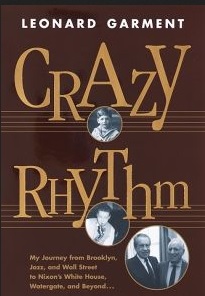The 43rd anniversary of the January 30, 1973 convictions of former Nixon aides G. Gordon Liddy and James W. McCord Jr. for conspiracy, burglary and wiretapping in connection with the break-in at the Watergate hotel brings to mind the turbulent years leading to the only presidential resignation in US history. The conviction was later upheld in United States v. Liddy, 509 F. 2d 428 (D.C.Cir. 1974).
The BLS Library has an extensive collection of material related to the Watergate scandal. One item was written by a noted alumnus of Brooklyn Law School, the late Leonard Garment (Class of 1949) who later became a member of the BLS Board of Trustees and an Adjunct Professor of Law. Garment (1924 – 2013) was an attorney who served Presidents Richard Nixon and Gerald Ford in various positions from 1969 to 1976, including Counselor to the President, acting Special Counsel to Nixon for the last two years of his presidency, and U.S. Ambassador to the Third Committee at the United Nations. Born in Brooklyn, he graduated Brooklyn Law School and joined the law firm of Mudge, Stern, Baldwin, and Todd (later called Nixon, Mudge, Rose, Guthrie & Alexander). There, Garment met Nixon and then worked on his 1968 presidential campaign, later becoming part of Nixon’s White House staff as special consultant to the president. He advised the president and worked on various special projects, particularly on civil and human rights, Indian affairs, and the arts.
His 418 page  book Crazy Rhythm: From Brooklyn and Jazz to Nixon’s White House, Watergate, and Beyond (Call No. E856 .G38 1997) is a fascinating autobiography of a Washington/Wall Street insider who thrived despite hard blows dealt him on more than one occasion. Garment tells how he left home early to pursue a career as a clarinet/saxophone player in jazz bands. After serving in WW II, he earned his law degree and soon became a close friend of the former vice president. An important member of the Nixon team, Garment became an all-purpose troubleshooter for the president. The tough-talking administration’s informal envoy to both US Jewry and Israel, Garment (who describes his ex-boss as operationally progressive but rhetorically retrogressive on social issues) also worked on civil-rights programs. He was untainted by Watergate, but his comments on the scandal are marked with perception and compassion. He eventually returned to New York City to serve as Daniel Patrick Moynihan’s special assistant for human rights during his stint as US ambassador to the UN, and then resumed the practice of law. The book is an engaging recollection of a free-spirited advocate who learned from his experiences close to the seats of power.
book Crazy Rhythm: From Brooklyn and Jazz to Nixon’s White House, Watergate, and Beyond (Call No. E856 .G38 1997) is a fascinating autobiography of a Washington/Wall Street insider who thrived despite hard blows dealt him on more than one occasion. Garment tells how he left home early to pursue a career as a clarinet/saxophone player in jazz bands. After serving in WW II, he earned his law degree and soon became a close friend of the former vice president. An important member of the Nixon team, Garment became an all-purpose troubleshooter for the president. The tough-talking administration’s informal envoy to both US Jewry and Israel, Garment (who describes his ex-boss as operationally progressive but rhetorically retrogressive on social issues) also worked on civil-rights programs. He was untainted by Watergate, but his comments on the scandal are marked with perception and compassion. He eventually returned to New York City to serve as Daniel Patrick Moynihan’s special assistant for human rights during his stint as US ambassador to the UN, and then resumed the practice of law. The book is an engaging recollection of a free-spirited advocate who learned from his experiences close to the seats of power.
